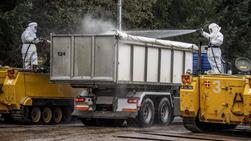 Workers disinfect a truck as Danish authorities dispose of dead mink in a military area near Holstebro on Nov 9, 2020. (MORTEN STRICKER/AFP)
Workers disinfect a truck as Danish authorities dispose of dead mink in a military area near Holstebro on Nov 9, 2020. (MORTEN STRICKER/AFP)
Denmark on Tuesday revised an order that would have seen all of the country's 15 million mink culled on fears the animals are hastening the spread of the coronavirus. The government realized it has no legal authority to carry out the order.
A report by the World Health Organization said that since June, 214 human cases of COVID-19 have been identified in Denmark with COVID-19 variants associated with farmed mink, including 12 cases with a unique variant reported on Nov 5
Instead, the government changed its position to "recommend" that farmers kill all mink to curb the spread of coronavirus. The government is putting forward new legislation for a mass culling. It normally takes 30 days to pass a new bill.
The Nordic country issued the order last week to kill all mink after it found out those infected with coronavirus are transmitting the virus with mutations back to people. Denmark is the first country where the virus was found transmitting itself back to human beings from the animal population.
A report by the World Health Organization said that since June, 214 human cases of COVID-19 have been identified in Denmark with COVID-19 variants associated with farmed mink, including 12 cases with a unique variant reported on Nov 5. The cases involved people ranging from 7 to 79 years old.
The WHO report said the initial observations suggest the clinical presentation, severity and transmission among those infected are similar to that of other circulating coronaviruses.
However, the new variant, referred to as "cluster 5", has a combination of mutations that have not been previously observed.
On Nov 5, Denmark announced a strict new lockdown in the northern part of the country, where most mink farms are located. Danish officials said 216 mink farms out of 300 were infected with coronavirus.
READ MORE: Danish mink cull shelved after govt botches virus response
WHO said the new variant identified in both mink and the 12 human cases has moderately decreased sensitivity to neutralizing antibodies. This could pose a potential risk to the effectiveness of future COVID-19 vaccines.
The WHO said further scientific and laboratory studies are required to verify the preliminary findings reported and to understand any potential implications of this finding in terms of diagnostics, therapeutics and vaccines in development.
According to the WHO, it remains a concern when any animal virus spills into the human population, or when an animal population could contribute to amplifying and spreading a virus.
Widespread testing
Besides a strict lockdown and culling mink, Denmark will also conduct widespread testing of people living in affected areas and increased genomic sequencing of SARS-CoV-2 viruses across the country.
CNN reported the UK banned travelers from Denmark due to the outbreak on Nov 7. UK citizens and visa holders will be able to return but will have to be quarantined for 14 days.
ALSO READ: Risk to humans seen as virus kills 15,000 US mink, Danes to cull
A report in The Guardian said 10 mink farms have identified the presence of COVID-19 in Sweden, which neighbors Denmark. So far Sweden has no plan to cull the mink.
A report by the US Agriculture Department said the coronavirus was reported to have been transmitted from a human to a tiger in New York in April. Since then, there have been reports of mink, dogs and cats contracting coronavirus from humans.


